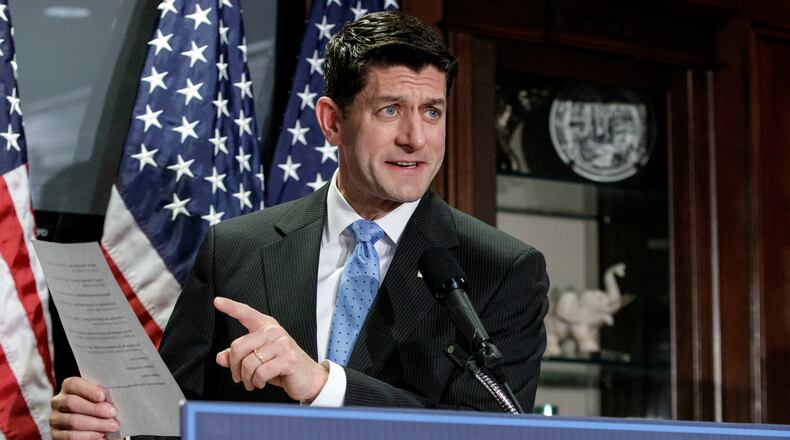A series of changes to the GOP's Obamacare replacement plan -- aimed at winning over hard-line conservatives -- could provide more financial aid to older Americans to help buy them insurance.
The move announced Monday night could bolster tax credits for people ages 50 to 64, many of them working class who voted for Donald Trump. The tax credits are aimed at helping people who don't have insurance through an employer buy their own coverage.
GUIDE: Health care replacement in Georgia
It’s unclear at this point just how much the new proposal might help.
Right now under the GOP plan, thousands of older Georgians -- many from rural areas that voted largely for Trump -- could lose thousands of dollars in tax credits.
Without it, some couldn’t afford coverage and would be forced to drop it.
Overall, an estimated 750,000 Georgians could lose their health coverage under the Republican plan, according to an analysis by Georgia State University. The proposed bill is set for a vote on the House floor on Thursday.
Both the GOP plan and Obamacare offer tax credits but in very different ways. Obamacare credits are based on family income, the cost of insurance and where you live. That set up benefits the poor the most. The GOP plan is mostly based on age, not income. It offers lump-sum credits between $2,000 to $4,000 depending on how old you are. So a 50-year-old making $20,000 a year and someone the same age making $50,000 would get the same amount.
President Trump met with Republican lawmakers Tuesday morning to urge them to get on board with the plan.
MAP: Changes to tax credits in Georgia under the GOP plan
MORE: Georgians with Obamacare left in the dark
House Speaker Paul Ryan also discussed the changes in a press conference Tuesday.
“I think what this comes down to is what it said on those banners last night at (Trump’s) rally in Kentucky; promises made, promises kept. Obamacare was anything but that. People were promised one thing and they were given another,” Ryan said. “They were promised that they'd get lower premiums. Instead, premiums are skyrocketing and people are paying so much more.”
Consumer advocates and Democrats argue the plan favors the wealthy to the detriment of the poor.
With just days before the House is expected to vote on the GOP plan, called the American Health Care Act, it is far from a done deal.
Members of the House Freedom Caucus are still opposed to the bill, though Ryan said Trump has won over some lawmakers within their ranks. But other hardliners want to see Obamacare scrapped in its entirety.
"While I have some concerns with this bill in its current form – chief among them being its impact on older Americans and continued federal government interference – I remain hopeful that we can advance a practical, market-driven health care plan that will reduce costs for American families," Rep. Jody Hice, a Georgia Republican and Freedom Caucus member, said through a spokeswoman on Monday.
Meanwhile, moderates in the House and Senate worry about the large numbers of Americans who could lose their insurance under the plan.
It could cause an 24 million people to lose their coverage in the next decade, according to estimates by the Congressional Budget Office, Congress' nonpartisan scorekeeper.
The plan would also reduce the federal deficit by nearly $340 billion over that period.
No estimates are yet available on how changes to the GOP plan could affect the deficit or the numbers of Americans who lose or gain insurance coverage.
If the plan does pass the House this week, it faces a tough battle in the Senate. Several Republican senators from states that have benefited from Medicaid expansion oppose the legislation.
The House Rules Committee is set to discuss the plan on Wednesday.
- Staff writer Tamar Hallerman contributed to this report.
About the Author
Keep Reading
The Latest
Featured


